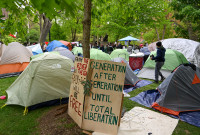


Desiree Hellegers hosts this episode of The Old Mole Variety Hour, which features
- Criminalizing Solidarity: Historian Rachel Ida Buff talks with Frann Michel about connections between attacks on encampments in support of Palestine and encampments of houseless people, as well as attacks on other forms of collective solidarity and the commons, including migrant caravans and water protectors, and on histories of resistance and Indigenous sovereignty. Professor Buff discusses these issues in her essay "The War to End All Encampments: Criminalizing Solidarity" in the January/February issue of Against the Current. Rachel Ida Buff is Professor of History at the University of Wisconsin, Milwaukee, where she is also affiliated faculty in African and African Diaspora Studies, Gender and Women's Studies, and Jewish Studies. Professor Buff is the author of A is for Asylum Seeker: Words for People on the Move/A de Asilo: Palabras para Persona en Movimiento (2020), Against the Deportation Terror: Organizing for Immigrant Rights in the Twentieth Century (2017) and other works, including essays in Boston Review, Truthout, Jacobin, Jewish Currents, and other venues.
-
Eco-Disasters in Japanese Cinema. Japan has rich traditions of filmmaking and of approaching films as commentary on daily life. But Japanese cinema also offers rich commentary on ecological crises. Jan Haaken talks with University of Oregon professor Rachel DiNitto about her new book, Eco-Disasters in Japanese Cinema. DiNitto explains how filmmakers take up Japan’s history as victims of US atomic bombings and nuclear testing as well as the Fukushima nuclear accident of 2011--and how films register public ambivalence and repression of the nuclear legacy. A touchstone throughout the book centers on how people both cope with ecological crises and resist the ongoing impacts of toxic industries.
-
Resisting Google in the Gorge: Since the construction of a Google data center in The Dalles, Oregon in 2006, the city has become a magnet for data centers looking for tax breaks, and cheap energy and water to power and cool them. Beginning in 2021, with representation from the Reporters Committee for Freedom of the Press, Oregonian reporter Mike Rogoway fought a protracted legal battle to gain access to data on Google’s water use. As Rogoway reported in 2023, the data showed that “Google’s water use in The Dalles has nearly tripled in the past five years, and the company’s data centers now consume more than a quarter of all the water used in the city.” As data centers continue to multiply in The Dalles, spurred on by AI, Desiree Hellegers speaks with Celilo Wy’am activist Lana Jack, about present and future impacts of Google water use on the “usual and accustomed places” of the Celilo Wy’am, and on N c’ wana–the Columbia River–in an age of droughts and climate collapse.
- KBOO



